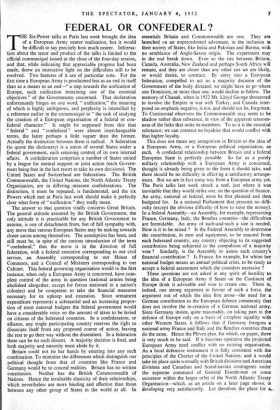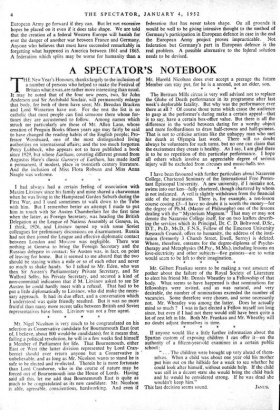FEDERAL OR CONFEDERAL ?
THE Six-Power talks at Paris last week brought the idea of a European Army nearer realisation, but it would be difficult to say precisely how much nearer. Informa- tion about the tenor and product of the talks is limited to the official communiqué issued at the close of the four-day session, and that, while indicating that appreciable progress had been made, threw an instructive light on the difficulties still to be resolved. Two features of it are of particular note. For the first time a European Army is proclaimed less as an end in itself than as a means to an end—" a step towards the unification of Europe, such unification remaining one of the essential objectives " of the Governments concerned. That declaration unfortunately hinges on one word, " unification," the meaning of which is highly ambiguous, and perplexity is intensified by a reference earlier in the communiqué to " the task of studying the creation of a European organisation of a federal or con- federal character." It might be supposed from this that " federal " and " confederal " were almost interchangeable terms, the latter perhaps a little vaguer than the former. Actually the distinction between them is radical. A federation (to quote the dictionary) is a union of several States under a federal government, each retaining control of its own internal affairs. A confederation comprises a number of States united by a league for mutual support or joint action (each Govern- ment being free in the last resort to take its own decisions). The United States and Switzerland are federations. The British Commonwealth, the United Nations, the North Atlantic Treaty Organisation, are in differing measure confederations. The distinction, it must be repeated, is fundamental, and the six Powers which met at Paris last week should make it perfectly clear what form of " unification " they really mean.
The answer to that question vitally concerns Great Britain. The general attitude assumed by the British Government, the only attitude it is practicable for any British Government to assume, is one of detachment from, but of full sympathy with, any move that various European States may be making towards closer union among themselves. The assumption has been, and still must be, in spite of the curious introduction of the term " confederal," that the move is in the direction of full federation, with a federal executive corresponding to our civil service, an Assembly corresponding to our House of Commons, and a Council of Ministers corresponding to our Cabinet. This federal governing organisation would in the first instance, when only a European Army is concerned, have com- plete control of the army in question (national armies being abolished altogether, except for forces stationed in a nation's colonies) and be competent to take the financial measures necessary for its upkeep and extension. Since armament expenditure represents a substantial and an increasing propor- tion of most national budgets the federal government would have a considerable voice on the amount of takes to be levied on citizens of the federated countries. In a confederation, or alliance, any single participating country reserves the right to dissociate itself from any proposed course of action, leaving the rest to go their way without the dissentient. In a federation there can be no such dissent. A majority decision is final, and both majority and minority must abide by it.
Britain could not tie her hands by entering into any such combination. To minimise the differences which distinguish our political thought from that of countries like France and Germany would be to conceal realities. Britain has no written constitution. Neither has the British Commonwealth of Nations. Hence the invaluable elaSticity of their relationships, which nevertheless are more binding and effective than those between any other group of States in the world at all. In essentials Britain and Commonwealth are one. They are launched on an unprecedented adventure, in the inclusion in their society of States, like India and Pakistan and Burma, with no semblance of Anglo-Saxon origin. The experiment may in the end break down. Even so the ties between Britain, Canada, Australia, New Zealand and perhaps South Africa will remain, and they are closer than any other ties we are likely, or would desire, to contract. By entry into a European federation, compelled to act as a majority decision of the Government of the- body dictated, we might have to go where one Dominion, or more than one, would decline to follow. The memory of Chanak, when in 1922 Mr. Lloyd George threatened to involve the Empire in war with Turkey, and Canada inter- posed an emphatic negative, is not, and should not be, forgotten. To Continental observers the Commonwealth may seem to be shadow rather than substance, in view of the apparent tenuous- ness of the links that unite its-members. To us it is the essential substance; we can contract no loyalties that would conflict with that higher loyalty.
This does not mean any antagonism in Britain to the idea of a European Army, or a European political organisation, as such, A confederal relationship between Britain and a federal European State is perfectly possible. So far as a purely military relationship with a European Army is concerned, thought is already being given to the form it should take, and there should be no difficulty in effecting a satidadtory arrange- ment. But we are in fact some way from a European army yet. The Paris talks last week struck a reef, just where it was inevitable that they would strike one, on the question of finance. An army, national or federal, must be first planned and then budgeted for. In a national Parliament that presents no diffi- culty (except the obvious difficulty of how to raise the money). In a federal Assembly—an Assembly, for example, representing France, Germany, Italy, the Benelux countries—the difficulties are formidable. An army of such-and-such a size is needed. How is it to be raised ? Is the Federal Assembly to determine the contribution, in men and equipment, to be exacted from each federated country, any country objecting to its suggested contribution being subjected to the compulsion of a majority vote ? Similarly, is the Assembly to assess each country's financial contribution ? Is France, for example, for whom her national budget means an annual political crisis, to be ready to accept a federal assessment which she considers excessive ?
These questions are not asked in any spirit of hostility to the idea of a European Army if States on the Continent of Europe think it advisable and wise to create one. There is, indeed, one strong argument in favour of such a force, the argument out of which the idea first arose—the need for a German contribution to the European defence community that does not involve the re-creation of a German national army. Since Germany insists, quite reasonably, on taking part in the defence of Europe only on a basis of complete equality with other Western States, it follows that if Germany foregoes a national army France and Italy and the Benelux countries !rust do the same. Hence the Pleven plan, for which, on paper, there is very much to be said. If it becomes operative the projected European Army need conflict with no existing organisation. As a local defensive instrument it is fully consistent with the principles of the Charter of the United Nations; and it would take its place quite normally with British divisions and American divisions and Canadian and Scandinavian contingents under the supreme command of General Eisenhower or some successor within, the larger orbit of the North Atlantic Treaty Organisation—which, as an article on a later page shows, is developing very satisfactorily. Let therefore the plans for European Army go forward if they can. But let not excessive hopes be placed on it even if it does take shape. We are told that the creation of a federal Western Europe will banish for ever the danger of another war between France and Germany. Anyone who believes that must have succeeded remarkably in forgetting what happened in America between 1861 and 1865. A federation which splits may be worse for humanity than a federation that has never taken shape. On all grounds it would be well to be giving intensive thought to the method of Germany's participation in European defence in case in the end the European Army project proves impracticable. Not federation but Germany's part in European defence is the real problem. A possible alternative to the federal solution needs to be devised.







































 Previous page
Previous page